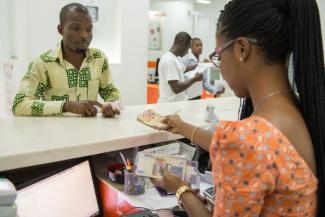CDU/CSU
Making a difference

None of the big challenges of the future can be solved without development policy. Whether the focus is world-population growth, rising energy demand for growing economies or anthropogenic climate change, development experience and instruments are needed more than ever. The longer we ignore those challenges or address them only superficially, the harder and more expensive they will be to tackle in the future.
The Sustainable Development Goals (SDGs) of the Agenda 2030 and the relevant Paris climate-protection targets provide guide rails for the development policy we pursue – guide rails that are, incidentally, institutionalised in Germany. The refugee crisis is the latest striking reminder of how much nation states are affected by developments in other countries. Owing to digitalisation and globalisation, human mobility has never been so high, even between continents. We thus not only have a responsibility to focus development policy more directly, especially on Africa; it is also in our own interest to do so. By 2050, the population of our continental neighbour is set to double to way over 2 billion. To be able to offer prospects for youth, Africa needs another 20 million new jobs a year. In Sub-Saharan Africa in particular, high birth rates and low economic growth – which generates little new employment – result in fragile states and migratory pressures. We need to break that vicious circle.
We laid the first major foundations for that during the present parliament. Largely thanks to the efforts of Chancellor Angela Merkel, the development budget is at a record level. The 0.7 % target has been reached for the first time in accordance with OECD criteria. That is a notable achievement, especially considering that other countries are cutting back official development assistance (ODA).
But development is not just a matter of money; it also requires structures and strategies. Without partner governments that work for the benefit of the country and not for personal gain, no development policy can be successful. Governance remains a crucial challenge. Hence the intense efforts made by Finance Minister Wolfgang Schäuble within the G20 to tackle financing issues and secure better conditions for investment. But a good environment and political will in countries themselves cannot take the place of development policy. When choosing partners, we need to pay more attention than at present to their willingness to accept accountability. Our key concern is to enhance our partners’ regulatory capacity.
Development Minister Gerd Müller’s Marshall Plan with Africa offers partner countries and the private sector a chance to work together on a better future by promoting the large-scale joint mobilisation of resources. We want to help our partners to generate more revenue and strengthen local investment conditions so that jobs can be created for the local community. Without private investment and the transfer of know-how, many African countries will not be able to meet the challenges ahead. And the consequences of that would be disastrous.
Efforts in the coming parliamentary term will therefore focus on filling those initiatives with life. In concrete terms, that means concentrating more on key countries and key sectors where our development policy commitment can make a difference. We need programmes that have an impact, promote common interests and involve other actors such as the private sector – altruism, dissociation and the kind of watering-can policy that has been practised for far too long are doomed to failure. Our professional new development policy is the only way to achieve the common goal of creating economically, environmentally and socially sustainable income prospects in Africa within our planetary boundaries.
Sibylle Pfeiffer is the development-policy spokeswoman of the CDU/CSU parliamentary group.
sibylle.pfeiffer@bundestag.de







